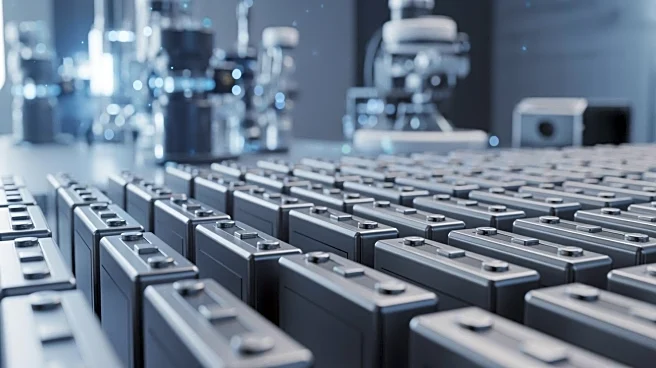What's Happening?
Recent studies have focused on the development and testing of sodium-ion batteries (SIBs) for renewable energy storage, particularly under extreme temperature conditions. The research involved fabricating
and testing various batches of SIB pouch cells, which demonstrated stable electrochemical reactions and consistent performance across multiple batches. The study highlighted the potential of SIBs for practical energy storage applications, achieving a specific energy of 96 Wh/kg at room temperature. The batteries were also tested at ultra-low temperatures, showing promising energy storage capabilities even at -25°C and -50°C. The research emphasized the importance of developing high-performance, cost-effective, and durable battery systems suitable for all-weather conditions.
Why It's Important?
The development of sodium-ion batteries is significant as it offers an alternative to lithium-ion batteries, which are currently dominant in the market. SIBs are particularly appealing due to their potential for lower costs and greater availability of raw materials. The ability of these batteries to perform well in extreme temperatures expands their applicability in various environments, including cold climates and potentially even space missions. This advancement could lead to more sustainable and resilient energy storage solutions, reducing reliance on lithium and addressing supply chain vulnerabilities. The research also underscores the importance of innovation in battery technology to support the growing demand for renewable energy storage.
What's Next?
Future research and development efforts are likely to focus on optimizing the materials and architectures of sodium-ion batteries to further enhance their performance and durability. There may also be increased interest in scaling up the production of these batteries for commercial applications, particularly in regions with extreme weather conditions. Additionally, the integration of SIBs with renewable energy sources, such as wind and solar power, could be explored to create more efficient and sustainable energy systems. As the technology matures, it could play a crucial role in the transition to a low-carbon economy.
Beyond the Headlines
The exploration of sodium-ion batteries highlights broader trends in the energy storage industry, including the push for diversification of battery chemistries and the need for environmentally friendly alternatives. The research also raises questions about the long-term sustainability of battery production and the environmental impact of mining and material extraction. As the industry evolves, there will be a need to balance technological advancements with ethical and environmental considerations.










